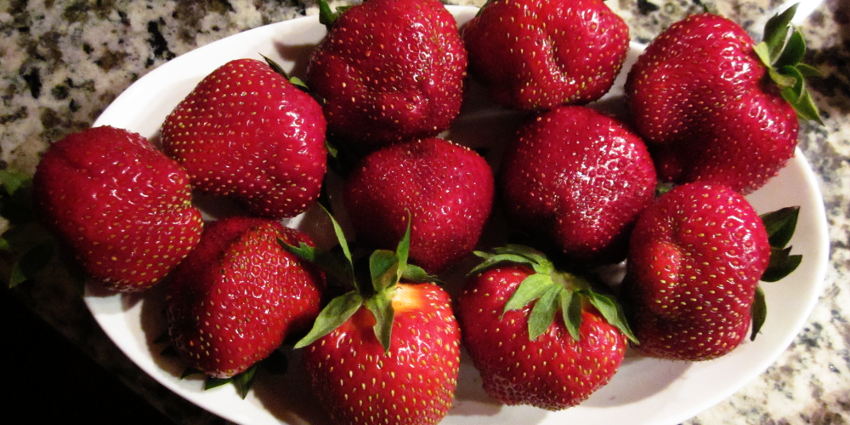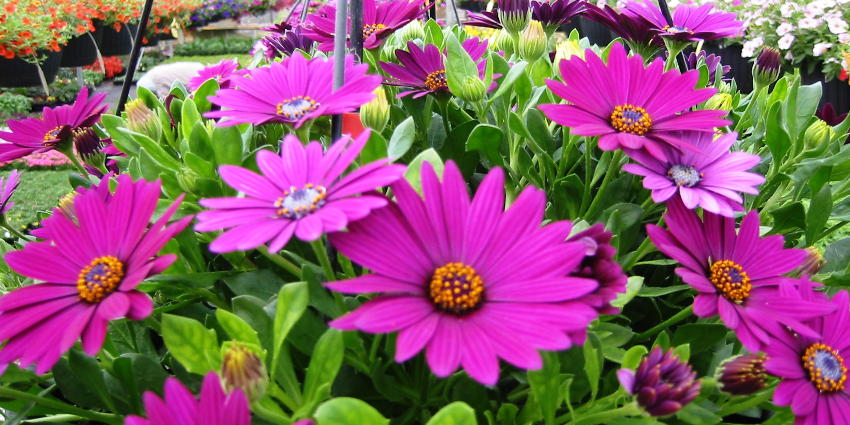Strawberry season is finished for another year. High temperatures ripened the crop faster than normal, creating a shorter than normal harvest season.
Strawberries are a long standing tradition at Richmond Nursery. We're the longest running strawberry grower in Eastern Ontario and we're very proud of our field. We pride ourselves on having the best berries and strive for flavour and quality over all else.
June bearing strawberries are perennials that bare fruit annually. Different kinds of berries have a slightly different maturity time and characteristics. The average berry season is from June 20th to July 20th, but factors like weather play a critical role in fruit maturity dates.
We have been growing strawberries since 1958. Though technology has changed significantly over the years, a number of our methods remain similar to our original plantations. We don't believe scientific advances should fundamentally alter the way a plant is grown to maximize yield and profitability. Instead, we believe in leveraging different technologies and methods to ensure the healthiest plants, varieties that provide taste over yield, and allow us to reduce our use of pesticides to grow a more sustainable and responsible crop. We would rather grow fewer berries very well than larger fields with a higher yield but greater environmental impact.
Our growing methods, in many ways, are more traditional and hands-on. Freshly planted berry plants are cultivated for the first two months to ensure the least amount of stress compared to the standard recommendations of beginning herbicide treatments two weeks after planting. On cold nights, we sleep in our fields and irrigate to protect our plants, a dedication that is getting more rare. We water our plants on a regular basis when Mother Nature doesn't provide the necessary rain. Strawberries also get stressed in high temperatures, so we cool our field on hot days to keep our plants happy since happy plants produce better food. Like everything we grow, we focus on quality, attention to detail, and environmental responsibility, despite the added costs associated with these methods.
Strawberries are also a rather risky crop and we have had our share of bumps and bruises from Mother Nature. Late frosts have caused significant losses over the years despite all our efforts to frost protect our plants. Hail storms have destroyed our crops rendering the berries into a pulp in the field. Wind storms and micro-bursts have tore through the field destroying our facilities. There have been many natural disasters in the over 60 years of berry growing in our family, but the love of a good strawberry has always kept our strawberry field going.
When it comes to harvesting our berries and pick-your-own fields, we run a very structured harvest to minimize waste. We ask that you respect the work we do and abide by the rules of our field. Here are some guidelines for our pick-your-own field.
- All harvests are based on assigned rows. You must stay in the row or area you are assigned to when you arrive. People are not permitted to wander the field and pick at their leisure in any part of the field.
- Picking times and the abundance of fruit in a particular field will vary based on what nature and the plants provide. Some picking days can be very fast while others will be slower. We check our rows before assignment and don't assign picked over rows. If you row is getting thin, ask one of our team for a new row.
- All berries are good berries so be sure to pick everything in your row, not just large berries and leave the rest. Berries are a food crop and no food should be wasted.
- Strawberries are often hidden from view from above as the plant prefers to cover it's fruit with the leaves to protect them from sunburn. Crouch down and lift the leaves to expose all the delicious fruit.
- Strawberries are now sold by basket, not by weight. We allow standard 2l and 4l baskets to be used during the harvest. Unfortunately, other containers cannot be used regardless if they are marked with a volume. Please do not attempt to overfill your baskets and cheat us out of our hard work.
- Help us recycle and reuse by bringing back your own basket to pick in. New baskets are available in the field for a cost. A "take a basket, leave a basket" bin will be available at times where used/returned baskets can be dropped off and taken. These baskets are provided as-is and have not be checked/cleaned/disinfected by Richmond Nursery.
- A little berry taste is allowed, but please do not steal our berries. It takes over a year of hard work to produce the first berry.
- If you have children, it is your responsibility to ensure they remain in your assigned row and that they do not walk on or step on any berries. As entertaining as strawberry picking is, you are harvesting a food crop, must respect others, and teach your children to respect the farm.
- All persons entering the field must pick a minimum of 2l of berries, or equivalent. Children under 12 are exempt. I.e. a family of 6 adults must pick 12l of berries which can be 6 x 2l baskets, or 3 x 4l baskets, etc.
- Any form of aggressive behaviour, disrespect, or failure to abide by the rules will not be tolerated. Those not in compliance will be asked to leave the field immediately without refund.


